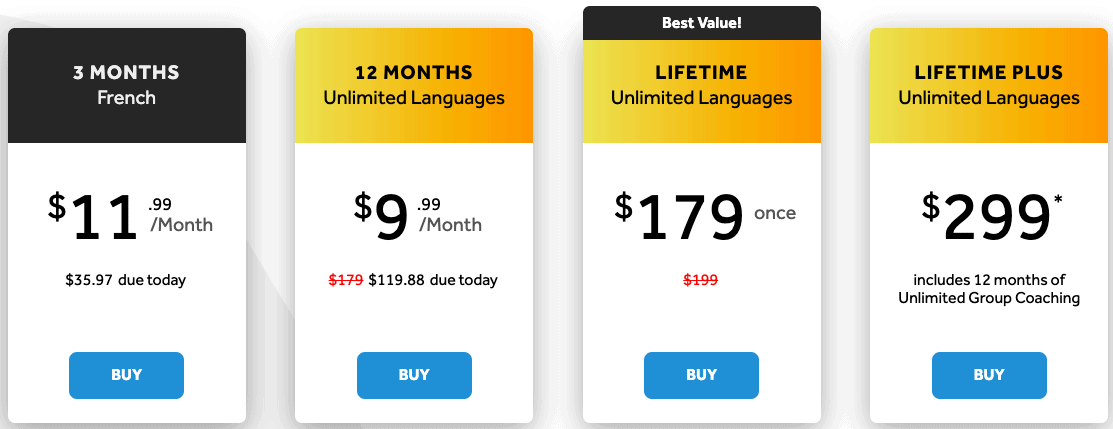How To Learn A New Language Fast Before You Travel This Year
It’s a common question that I get, “how do you learn a language on your own?”, “What are the new ways to learn a new language fast?” or “how to take notes when learning a new language?” I’ve been saying I want to learn a new language for years, but it keeps falling lower and lower on my to-do list. Sometimes, I wonder if there is a quick way to learn to speak a new language in 10 days.
Between work, social obligations, and trying to find time to relax—AND surviving a global pandemic—I don’t have the time to go to classes or hire a tutor to learn new words and phrases. So what does it take to learn a new language, or how do you motivate yourself to learn it?
I always assumed that becoming bilingual would take time and money. A few months ago, I decided to stop making excuses and search online “how to learn a new language by yourself” and see if there was an easy way for me to start learning French.
Now the question is, how does your brain learn a new language? One thing I could draw up was that children learn a language fast. Does that mean it is too late to learn a new language? If so, what’s the best age to learn a new language?
A common suggestion from experts and other people who speak more than one language is to immerse yourself as soon as possible by traveling and making friends with native speakers. That way, you can start developing conversational skills immediately instead of spending days, weeks, or months studying grammar rules and vocabulary first. But how can you do that when you don’t have any friends yet and don’t know any places to visit?
The Secret To Learning a New Language
I often ask my peers how to learn any language. They would advise me to make the best use of time during quarantine. The pandemic in 2020 has forced us to spend more time at home, so what is a better time to pick up a new skill?
Moreover, some of my friends suggested that rather than spending hours a day trying to learn complex languages, it’s better to enjoy the process of learning. For instance, I was listening to music in a new language or watching tv shows. By doing so, you will stay motivated and find the learning method delightful.
In addition, the other fastest way to learn a new language is with a language partner. But if you’re not lucky enough to have a new friend who speaks the same language, find one online.
Many great apps allow you to meet and speak with native speakers of the language you want to learn in your home country. Another option is hiring a tutor through an app like Duolingo or Rosetta Stone.
Either way, make sure to have regular sessions that consist of speaking exercises and practice conversations. Spending hours studying grammar books will only get you so far; active learning will take you much further than repeatedly sitting down and reading dry sentences out loud.
Don’t be afraid to use any opportunity to practice what you’ve learned – try picking up phrases from TV shows or podcasts while they’re airing and see if your language partner can help you translate. You’ll start feeling more comfortable in no time!
I thought about signing up for online classes, but that would still require me to submit assignments and stick to a course schedule. I need something that fits my lifestyle, and luckily I found Rosetta Stone. If you are wondering how to learn a language fast and fluently, I can guarantee Rosetta Stone is your choice!
Here is how I used my time this year to learn a new language and how Rosetta Stone got me there!
How To Learn a Language Fast and Fluently in Less Than 30 Minutes a Day
Most people who want to learn a new language fast and fluently in less than 30 minutes a day find that the most effective way is to practice speaking with native speakers. It’s essential to set aside time for practice sessions. One hour per day is recommended, but as little as 10-20 minutes can make a difference.
The key is to be consistent daily so you don’t lose momentum or motivation. In addition, speaking with someone who speaks your mother tongue will help you better understand the pronunciation and meaning of individual words.
It also turns out that learning a foreign language doesn’t have to require long hours and pointless assignments!
Start learning with simple and short dialogues.
As most language experts and authors like Gabriel Wyner and Olly Richards would say, the secret to learning a new language is to start with short, simple dialogues. If you’re unsure what words to use, try asking how to ask for directions or ordering at a restaurant.
These are easy ways to get started and provide a method of practicing your grammar skills in conversation. Then, when you’re ready, move on to more brutal dialogue sentences that will help you make your conversations more natural and fluent.
Start by speaking as little English as possible, then gradually add more of the language until it’s completely replaced. Eventually, you can go back and forth seamlessly between languages. It might take some time, but the payoff is worth it.
Once you learn how to speak fluently in a foreign language, your travels abroad will be more enjoyable, and this skill also translates into increased career opportunities. So now’s no excuse for not mastering a speech before your next vacation.
You can have basic conversations in any country with just a few weeks of study time. So grab a dictionary, open up Duolingo, or turn on Rosetta Stone and let’s get started.
The first step is to start small, like greeting someone or apologizing. Then work your way up to longer, more complex sentences over time. Don’t worry about making mistakes – after all, we’re human!
Pronunciation should be studied very early.
Pronunciation is the most challenging part of a new language, so studying pronunciation early on is essential.
The easiest way is to find a native speaker and ask them to record themselves speaking different words or phrases you intend to learn. Next, study this recording with subtitles in your language, and then try to repeat what you hear.
If possible, have a friend do the same exercise on a daily routine. Another technique for studying pronunciation is using repeating loops like those found in Google Translate’s text-to-speech tool.
Listen to the same word being said repeatedly, noting how it sounds different each time. Listen to both male and female speakers if available. Many free resources online will help you with pronunciation on your language learning journey, including YouTube videos, podcasts, and audiobooks.
Don’t be discouraged by your mistakes; remember that everyone has to start somewhere!
Spend just five minutes per day learning pronunciation before traveling abroad this year. Practicing speech exercises using recordings from native speakers can be an efficient way to improve your pronunciation quickly.
You only need access to YouTube videos, podcasts, or audiobooks in your target language lessons. Note how pronunciation changes over time, not just at the beginning of words but also at the end. Note any differences between vowel sounds between languages as well.
Sometimes A’s sound like E’s, and Os sound like U’s. In other cases, letters that seem similar in English might have completely different pronunciations in another language. For example, B might sound like P (puh) in Spanish or D (duh) in Turkish.
Even though there are many resources online, you don’t need much money to improve your pronunciation. Instead, try improving your pronunciation before going abroad this year.
Learning A New Language Through A book
Learning a new language can be hard work, but it doesn’t have to be. If you want to learn a language fast, the best thing you can do is to start by learning the basics. Another great way or first step you can take is to pick out the perfect book for you and set up a schedule that fits your lifestyle.
You’ll need to find time for reading, listening, and speaking to get into an optimal learning rhythm. Then, follow the learning process of reading, listening, and speaking every day until you’ve mastered the basic skills of your new language.
Once you’ve learned how to conjugate verbs and ask questions or, better, the right words, it’s time to explore some more advanced aspects of the culture. After all, what good is knowing how to ask for directions if you don’t know which direction someone needs help with?
So brush up on cultural customs like manners, etiquette, familiar words, and local holidays to better understand the new people around you. But always remember not to take any of these things personally and give it much time – there are many reasons why certain things might be done differently from place to place.
It’s also important to stay flexible while traveling because life throws us curveballs sometimes. Don’t beat yourself up if you can’t speak the language fluently yet — keep practicing and put in a lot of work.
While living abroad, the good thing is that it’s also helpful to try and integrate as much as possible without losing your identity or forgetting where you came from. Take pictures and videos of memorable moments, eat food from your home country at least once a week, and write about your experiences online so family and friends back home can follow along. You will find those specific goals to learn the language is going expressly.
Go with Confidence and a Positive Attitude
One of the most important things to do when learning a new language is to go with confidence and a positive attitude.
The best way to learn is by immersing yourself in the language and being exposed to it as much as possible. Find native speakers or a private teacher willing to help you, watch films or TV shows in that language, read newspapers, listen to music – anything that can expose you to the language and increase your exposure.
You need enough time, but if you have the right attitude and are confident that you’ll be able to learn the language, then before long, you’ll speak like a native. If there’s one thing I’ve learned from my experience, it’s that once you start taking small steps every day toward becoming more proficient in the new language, everything becomes more evident.
Whether it was listening to an audiobook on my commute home or watching movies with subtitles, slowly but surely, I found myself understanding and participating in conversations without feeling lost.
And even though I still make mistakes, after six months of learning, I can confidently say that this makes me feel proudest: knowing that through hard work and dedication to myself and my goal, I’ve succeeded. So don’t forget to be confident, stay positive and keep going – you’ll find it easier daily!
Set up your journey in a place you love
If you love traveling, it is time to embark on a journey. And with the plethora of countries to visit, your work has been cut out for you. However, before starting your new adventure, why not invest time and effort into learning a new language?
will give you a whole new perspective on the country and make communication much easier. So how can you go about learning a new language?
First, you need to get a feel for what type of learner you are.
- Are you a visual learner who likes seeing things in action, or are you a more auditory learner who prefers listening and hearing things?
Or maybe you’re both! Knowing which one suits you best will help you learn faster. For example, if you’re an auditory learner, it may be best for you to listen to different languages instead of watching them spoken.
On the other hand, if you’re a visual learner, watching videos might be the most beneficial. Whatever the case, discover which method appeals to you more and go from there.
Once you know what works for you, then it’s time to start putting this knowledge into practice. The next step would be to find a video series that caters to your needs, whether online courses, YouTube channels, podcasts, or others.
Once you’ve found the perfect resource to use, make sure that you commit yourself to it by following through. Take advantage of every opportunity, such as during long car journeys or working out at the gym.
Alternatively, you could download apps on your phone or tablet that provide valuable resources, like ‘Duolingo’, which teaches many languages in just 20 minutes daily. There are plenty of options, so explore the vast selection until you find something suitable. Above all, don’t let anything stand in the way of your journey toward fluency.
Learn a New Language with Rosetta Stone
Rosetta Stone is designed to fit into your everyday life. Lessons take only 15 to 30 minutes a day. Therefore, you can now stop wondering how to learn a new language without long and tedious classes and instead learn a new language in a month!
The amount of time Rosetta Stone takes for elementary proficiency in any language is quite surprising. You no longer need to ask around or search online to learn a new language faster. It’s the best way to learn a language online.
The bite-sized lessons make it easier for your brain to absorb the learnings. Their classes are exciting, interactive, and designed to teach you real conversational vocabulary.
When someone asks me how to learn a foreign language on my own, I recommend them Rosetta Stone without any second thought. I love that I can pop in my headphones on the way to work or when I’m cleaning my apartment, so it’s much better than sitting through a boring class.
That aside, we will talk about the benefits of Rosetta Stone. While learning a new language with Rosetta, I also recommend ensuring you have people around you that understand the language you are trying to learn, even if it’s their second language.
For instance, if you want to learn German quickly before your trip next year or before visiting any foreign country, it might be worth talking with Germans on Facebook Messenger or in an app like HelloTalk.
Conversing in German with one of these people could teach you how to pronounce certain words correctly and introduce you to new vocabulary for an effective language-learning process. You may even get to ask them about their culture and share stories about where you’re from.
Benefits of Rosetta Stone
Rosetta Stone is a language acquisition program that helps you learn a new language with zero prior knowledge. It’s the fastest way to learn any foreign language, available in 100 languages. The complete Rosetta Stone course teaches you the correct pronunciation of each word so you’ll sound like a native speaker while mastering your new mother tongue or second language as if it were your first.
It’s Convenient
Are you still wondering how to learn a new language effectively? Well, Rosetta Stone’s app could not be more convenient. You can use it anytime, anywhere, for language exchange.
Learning a new language has properly spaced repetition. Practice makes perfect for new language learners, whether you are learning Spanish or Spanish French. And that’s what this app is all about!
The learning never stops, even without WiFi! You can download the lessons and listen to them on your commute. It’s much better than scrolling social media for half an hour. I love that I can use that critical period to learn.
You can learn new words and language fast, just at the pace of young children. Therefore, with the help of Rosetta Stone, you can finally stop wondering how long it will take to learn a new language. Believe me when I say even native speakers can find their comfort zone and develop their language skills. It’s like you listen to the radio and start learning the target language.
Interactive Features
Rosetta Stone has tons of methods for learning a language. Its innovative features, like TruAccent®, show you exactly how accurate your pronunciation is when you speak. It’s fantastic because I never have the time to study what I sound like, so this gave me more confidence in the real world.
The Phrasebook and Seek & Speak® features will be a godsend when I visit Paris later this year. Phrasebook teaches you short valuable expressions you will need to know if you visit your country of origin for your language.
Seek & Speak® lets you partake in a fun scavenger hunt-like activity for everyday items, like fruits and veggies. It tasks you with seeking out a list of items, and once you take an image of one of the items, it will translate the native language for you.
Such a fun and interactive way to keep learning and speak the language you want. I can’t wait to hit a farmer’s market and test it out!
There are no limitations on where you can use this service.
You can use it anywhere on your smartphone, tablet, or computer!
Rosetta Stone makes learning English words more accessible than ever before! You don’t have to travel to a foreign country for years to learn to speak another language – sign up for Rosetta Stone today! Get access to this language-learning process through the Rosetta Stone platform now.
It Has Access To All Languages
You can access all their languages when you sign up for Rosetta Stone‘s annual or lifetime plan. The languages they offer include:
- Arabic
- Dutch
- Filipino
- French
- German
- Greek
- Hebrew
- Hindi
- Irish
- Italian
- Japanese
- Korean
- Mandarin Chinese
- Persian
- Polish
- Portuguese
- Russian
- Spanish
- Sweedish
- Turkish
- Vietnamese
I’m determined to crack French, but I love having the option to pick up a conversational grasp of a new language if I travel to that country. If you are still thinking about how to learn a new language in 10 days, look no further.
Whether you want to learn French, Italian, German, or any other European language, with Rosetta Stone, you can build that common European framework of reference of various languages by conquering the left and right hemispheres in one go!
Get started learning one (or more) of these beautiful languages now!
It’s Affordable
An annual subscription to Rosetta Stone is only $9.99 a month and gives you access to all languages. They also have a Lifetime Subscription, and to join, you only need to pay a one-time fee of $179! Or, if you want to try it out before committing, their 3-month subscription costs $11.99 per month.
Such a steal, considering the number of excellent features their program has. Rosetta Stone is way more affordable than going to classes or hiring a tutor, and their approach to learning a new language is just better.
I’ve been using Rosetta Stone for two months and am proud of my progress. Their app makes it easy to stick to it and not give up. I can finally tick “learn French” off my bucket list.
It builds on the idea of immersion.
Rosetta Stone is a software program designed to teach you new languages. It builds on the idea of immersion and is one of the most effective ways to learn a new language quickly. Using Rosetta Stone teaches vocabulary, grammar, pronunciation, spelling, reading, and writing in your new language.
The best part?
New friends are waiting for you at the end of every lesson. All lessons take 30 minutes or less, so squeezing them into your busy schedule is manageable. Rosetta Stone makes learning fun, unlike other learning methods that are difficult to stick with. To start today, you need an internet connection and a free trial offer from Rosetta Stone.
Don’t wait any longer — learn a new language with Rosetta Stone now!
The folks at Rosetta Stone are extending a special offer to our readers: Up to 45% off Rosetta Stone + Unlimited Language Access!
Here’s What People Are Asking About Rosetta Stone
Set a schedule, stick to it, and don’t let anything get in your way.
Set yourself a schedule and stick to it.
Don’t let anything get in your way.
Stick to the schedule you set for yourself and be consistent. If you take that first step, everything else will fall into place.
Try setting up times each day when you can learn new vocabulary and grammar points. If one of those days gets interrupted, the rest of your schedule is intact. It’s also important not to forget to have fun while you are learning-you should reward yourself after every 30 minutes of study time with something from this list: 10 push-ups, ten sit-ups, or ten squats.
Write about what you just learned on a sticky note and put it on your wall as a reminder for future use. Read an entertaining story in that language before bedtime to help work out any kinks that might remain after studying.
Reward yourself whenever you reach a milestone. Keep doing whatever it takes until you reach your goal. And last but not least, don’t give up when the going gets tough; keep pushing through and know that no matter how many hours you spend trying to learn, there is always room for improvement.
Conclusion
If you want to learn a new language before your next trip abroad, this guide will give you the tools and tricks to help you start mastering a new language.
With these methods and techniques, you can quickly acquire the vocabulary of any language and have conversations with native speakers in no time. Remember these tips when learning a new language, and enjoy your trips abroad more than ever!












